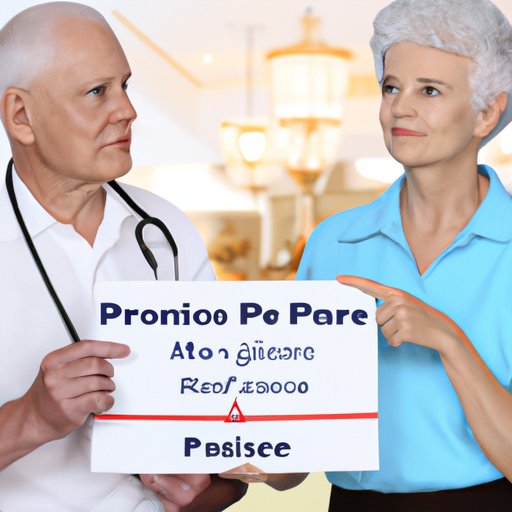Introduction
Home care assistance is a vital service for elderly and disabled individuals who are unable to perform essential activities of daily living (ADLs) independently. Medicare, the federal health insurance program for people over 65 or those with certain disabilities, covers some home care services. However, it is important to understand what types of home care assistance are covered by Medicare and how to pay for services that are not covered. This article provides an overview of the types of home care assistance covered by Medicare and compares these options to private insurance policies. It also examines how to pay for home care assistance not covered by Medicare and highlights available resources for finding and choosing home care providers. Finally, this article analyzes recent changes to Medicare home care coverage regulations.
Types of Home Care Assistance Covered by Medicare
Medicare home care coverage includes in-home skilled nursing services, physical therapy, occupational therapy, speech-language pathology, and home health aide services. These services can help elderly and disabled individuals remain safe and independent in their own homes, while providing family members and caregivers with peace of mind.
In-Home Skilled Nursing Services
Skilled nursing services include wound care, intravenous therapy, medication administration, and other medical services. Medicare Part A covers up to 35 hours of skilled nursing care per week, provided the patient qualifies for home health care services. Medicare Part B covers 80% of the cost of medically necessary skilled nursing services that are ordered by a doctor.
Physical Therapy Services
Physical therapy services are designed to help improve mobility, strength, balance, and coordination. Medicare Part B covers 80% of the cost of physical therapy services that are prescribed by a doctor. The patient is responsible for the remaining 20%.
Occupational Therapy Services
Occupational therapy services are designed to help patients regain their ability to perform everyday tasks such as dressing, bathing, and eating. Medicare Part B covers 80% of the cost of occupational therapy services that are prescribed by a doctor. The patient is responsible for the remaining 20%.
Speech-Language Pathology Services
Speech-language pathology services are designed to help patients improve their communication skills. Medicare Part B covers 80% of the cost of speech-language pathology services that are prescribed by a doctor. The patient is responsible for the remaining 20%.
Home Health Aide Services
Home health aide services are designed to help patients with activities of daily living (ADLs) such as bathing, dressing, and meal preparation. Medicare Part A covers up to 35 hours of home health aide services per week, provided the patient qualifies for home health care services.

Comparing Medicare Home Care Coverage with Private Insurance Options
When considering home care assistance, it is important to compare the coverage offered by Medicare with private insurance policies. This will help determine which option is best for the individual’s needs and budget.
Cost Considerations
Medicare typically offers lower out-of-pocket costs than private insurance policies. Additionally, most private insurance plans require a copayment for each visit, whereas Medicare only requires a copayment for each type of service. Many private insurance policies also have higher deductibles and coinsurance rates than Medicare.
Quality of Care
The quality of care offered by Medicare-approved home care agencies is generally comparable to that of private insurance policies. Both Medicare and private insurance policies require home care agencies to be licensed and meet certain standards of care. Additionally, both require home care agencies to provide detailed documentation of each patient’s condition and progress.
Availability of Services
The availability of home care services may vary depending on the type of insurance policy. Private insurance companies may offer a wider range of home care services than those covered by Medicare. Additionally, some private insurance policies may cover home care services that are not covered by Medicare, such as adult day care or respite care.
Examining How to Pay for Home Care Assistance Not Covered by Medicare
For home care assistance that is not covered by Medicare, there are several options for paying for these services. Out-of-pocket expenditures, financial aid programs, and long-term care insurance are all viable options for covering the cost of home care assistance.
Out-of-Pocket Expenditures
For those who do not qualify for Medicare home care coverage, out-of-pocket payments are often the only option. Out-of-pocket payments may include a one-time fee or a monthly fee. It is important to research the costs of different home care providers before making any decisions.
Financial Aid Programs
There are a variety of financial aid programs available to help cover the costs of home care assistance. These programs may include Medicaid, veterans benefits, state-funded programs, and charitable organizations. It is important to research the eligibility requirements of each program before applying.

Highlighting Available Resources for Finding and Choosing Home Care Providers
Finding a reliable and reputable home care provider can be a daunting task. Fortunately, there are a variety of resources available to help individuals find and choose the right home care provider. These resources include government programs, non-profit organizations, and online resources.
Government Programs
The Department of Health and Human Services provides a list of government programs that may be able to assist with home care costs. Additionally, the Centers for Medicare & Medicaid Services offers an online tool to help individuals find home care providers in their area.
Non-Profit Organizations
There are a number of non-profit organizations that provide information about home care providers. The National Association of Professional Geriatric Care Managers (NAPGCM) is a good resource for finding qualified home care providers. Additionally, many local Area Agencies on Aging offer resources for finding home care providers.
Online Resources
Finally, there are a variety of online resources available to help individuals find and choose home care providers. Websites such as Caring.com, A Place for Mom, and SeniorLiving.org provide comprehensive listings of home care providers in their respective areas.

Analyzing Recent Changes to Medicare Home Care Coverage Regulations
Recent changes to Medicare home care coverage regulations have had a significant impact on the availability and cost of home care services. It is important to be aware of these changes in order to make informed decisions about home care assistance.
Impact on Eligibility Criteria
Recent changes to Medicare home care coverage regulations have made it more difficult for individuals to qualify for coverage. In order to qualify for home care services, a patient must now meet stricter criteria, including a need for ongoing medical supervision from a physician. Additionally, patients must be certified as homebound by their doctor.
Changes to Reimbursement Rates
Recent changes to Medicare home care coverage regulations have also resulted in lower reimbursement rates for home care providers. This has led to some home care providers no longer accepting Medicare patients or reducing the number of home care services they offer.
Updates to Documentation Requirements
In addition to changes to eligibility criteria and reimbursement rates, Medicare has also updated its documentation requirements for home care services. Home care providers must now submit detailed documentation of each patient’s condition and progress in order to receive payment for services.
Conclusion
Medicare home care coverage can be a valuable resource for elderly and disabled individuals who need assistance with activities of daily living. It is important to understand the types of home care services covered by Medicare and how to pay for services that are not covered. Additionally, it is important to be aware of recent changes to Medicare home care coverage regulations in order to make informed decisions about home care assistance.
(Note: Is this article not meeting your expectations? Do you have knowledge or insights to share? Unlock new opportunities and expand your reach by joining our authors team. Click Registration to join us and share your expertise with our readers.)
